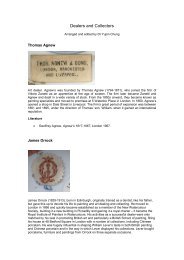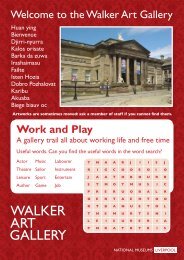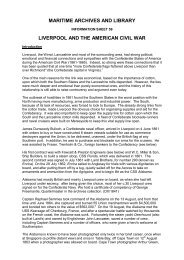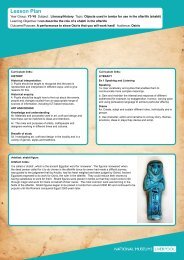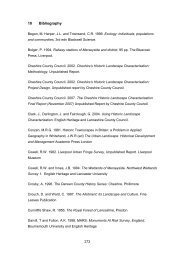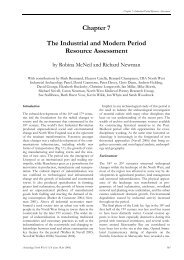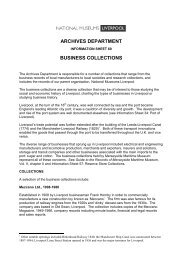Frank Partridge and William Hesketh Lever - National Museums ...
Frank Partridge and William Hesketh Lever - National Museums ...
Frank Partridge and William Hesketh Lever - National Museums ...
You also want an ePaper? Increase the reach of your titles
YUMPU automatically turns print PDFs into web optimized ePapers that Google loves.
married, Robert <strong>and</strong> Doris took a small shop in Great Portl<strong>and</strong> Street, where theyquickly attracted attention through the fine quality of their goods. Dorisunderstood the way the markets went much better than Robert did, because shehad made contacts in the trade through her parents. Robert was serving a formof apprenticeship, first with the Cohen family, <strong>and</strong> then with his wife.Looking for a job with a ‘knowledge of practice’, <strong>Frank</strong> joined Robert around18911892. In his memoirs he noted, ‘I had to work hard with Robert. … Frommorning to night I was kept busy in the shop <strong>and</strong> in the storeroom, brushing theshelves, fetching trays, carrying exhibits <strong>and</strong> lifting <strong>and</strong> shifting cases of china,which Doris had managed to buy cheaply at one of the sales.’ 7‘One important aspect of antiques which I was fortunate enough to discover rightat the beginning is that their genuineness can always be ascertained by he whohas a real knowledge of the colours used on the originals, by the first craftsmen.It is a knowledge which can be acquired through personal experience, <strong>and</strong> notthrough theory; through one’s own eyes <strong>and</strong> not by the books of others.’ 8After the youngest brother, Leonard, came to join Robert’s business, <strong>Frank</strong> hadsome time to get out <strong>and</strong> see London <strong>and</strong> to experience himself as a ‘youngblooded dealer’. The most vivid memory he later described was going to theCaledonian ‘Cattle Market’ 9 with his brother <strong>and</strong> trying to sell things there, butwithout financial success. In 1893 <strong>Frank</strong> was offered a job by an American dealerfrom Chicago who came one day to Robert’s shop <strong>and</strong> asked him if he wasinterested in a new career. The Chicago of 1893 was a city of superlatives. 10 Ithosted the 1893 World’s Columbian Exposition, which was much bigger thanLondon’s Crystal Palace Exhibition of 1851, <strong>and</strong> even bigger than the 1889 ParisExposition. Encouraged by Robert, <strong>Frank</strong> decided to go to Chicago to make hisAmerican dream come true <strong>and</strong> was happy to accept the conditions: ten dollars aweek <strong>and</strong> free board.Unfortunately the dream soon turned into bitter reality. <strong>Frank</strong> didn’t get paid aspromised, <strong>and</strong> sadly he had to leave the shop, trying to survive in several jobssuch as polishing furniture for an Italian <strong>and</strong> performing as ‘Engl<strong>and</strong>’s LeadingComedian’ for one night in a local theatre. He convinced a German antiquesdealer of his skills <strong>and</strong> reliability by cleaning his horses <strong>and</strong> worked in his shopfor a while, but when <strong>Frank</strong>’s sister sent some money for the passage home heleft America. Emily was waiting for him in Liverpool. ‘I would not be seeking out apark bench to rest on, but that instead I would be going to sleep in the bed I had7G. B. Spencer, 1961, p.19.8G. B. Spencer, 1961, p.19.9In the early 20th century, as the trade in live animals diminished, a bricabrac marketdeveloped which after the Second World War transferred south of the river becoming the NewCaledonian or Bermondsey Market. The markets finally closed in 1963.10C. M. Rosenberg, America at the Fair: Chicago’s 1893 World’s Columbian Exposition, p.62.3



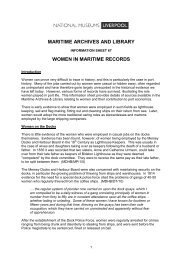
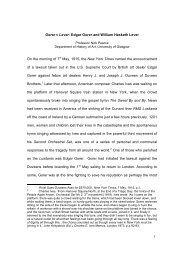
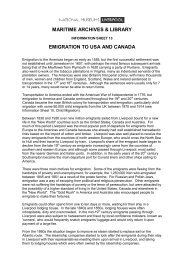
![Ancient Egypt trail [227kb .pdf] - National Museums Liverpool](https://img.yumpu.com/48998817/1/184x260/ancient-egypt-trail-227kb-pdf-national-museums-liverpool.jpg?quality=85)

